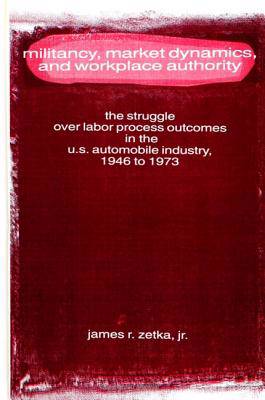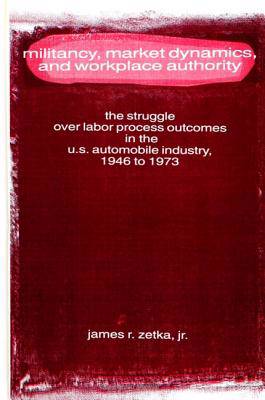
Wil je zeker zijn dat je cadeautjes op tijd onder de kerstboom liggen? Onze winkels ontvangen jou met open armen. Nu met extra openingsuren op zondag!
- Afhalen na 1 uur in een winkel met voorraad
- Gratis thuislevering in België vanaf € 30
- Ruim aanbod met 7 miljoen producten
Wil je zeker zijn dat je cadeautjes op tijd onder de kerstboom liggen? Onze winkels ontvangen jou met open armen. Nu met extra openingsuren op zondag!
- Afhalen na 1 uur in een winkel met voorraad
- Gratis thuislevering in België vanaf € 30
- Ruim aanbod met 7 miljoen producten
Zoeken
Militancy, Market Dynamics, and Workplace Authority
The Struggle Over Labor Process Outcomes in the U.S. Automobile Industry, 1946 to 1973
James R Zetka Jr
€ 145,45
+ 290 punten
Uitvoering
Omschrijving
This book is an account of the political economy of labor relations in the U.S. automobile industry from the end of World War II to the 1970s. Zetka develops a sophisticated paradigm of hegemonic and competitive market conditions that challenges dominant theories of postwar industrial relations, linking rates of workplace militancy to product market fluctuations, variations in work organization, and differences in authority systems legitimated on the shop floor. He then uses this model to interpret in historical detail the complex market and workplace relationships that unfolded in the industry. Zetka traces the postwar struggles between management and militant auto workers over the definition of a fair day's work. He argues that management's selective use of a quota-based authority system for occupational groups that had been the most militant during the 1940s and 1950s was primarily responsible for the decline of wildcat strike activity in the auto industry, and that this system was made possible by the emergence in the 1960s of a distinctive market structure that regulated competition between the surviving auto firms.
Specificaties
Betrokkenen
- Auteur(s):
- Uitgeverij:
Inhoud
- Aantal bladzijden:
- 293
- Taal:
- Engels
- Reeks:
Eigenschappen
- Productcode (EAN):
- 9780791420652
- Verschijningsdatum:
- 23/12/1994
- Uitvoering:
- Hardcover
- Formaat:
- Genaaid
- Gewicht:
- 607 g

Alleen bij Standaard Boekhandel
+ 290 punten op je klantenkaart van Standaard Boekhandel
Beoordelingen
We publiceren alleen reviews die voldoen aan de voorwaarden voor reviews. Bekijk onze voorwaarden voor reviews.











